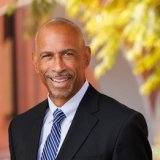A pandemic, a demographic change, challenges to race-aware admissions and waning public confidence have made enrollment outreach, admissions, financial aid and student retention increasingly more challenging. To address these concerns, 120 higher education enrollment leaders from around the country gathered for the annual Center for Enrollment Research, Policy and Practice’s (CERPP) Conference with the theme “Standing on Shaky Ground: Leading Enrollment Management in 2023.”
Held from Feb. 5 to 7, a return to an in-person conference was a welcome opportunity for attendees. Jerry Lucido, USC Rossier professor of clinical education and scholar-in-residence, said, “The interactions at the sessions, in the hallways and at the meals and receptions were exceptional, with colleagues digging deep on the issues and how they matter in the local and national contexts.”
In addition to examining the national enrollment crisis, attendees talked about the lessons learned from the pandemic, collaborating for the public good and staff retention and development. The current student population has changed since the pandemic, which has shifted the focus of enrollment management. Sharon Alston, former vice provost for undergraduate enrollment at American University in Washington, D.C., participated in a panel on analytics and algorithms. “I think being mindful and very intentional about the demographic changes, being very intentional about the population that’s coming through and focusing on their needs is critical,” Alston said.
Beyond getting accepted, universities also face student retention concerns, not only with first-year students but in providing a welcoming environment for transfer students. Alston added: “Certainly these are students who will have very different kinds of needs, but needs are not deficits. I think more of a focus on retention and the feeling of belonging is necessary.”
A panel on the public perception of universities featured panelists Eric Hoover, senior writer at The Chronicle for Higher Education, and Ted Mitchell, president of the American Council on Education. The pair highlighted poor advising and poor connections to careers, alongside a lack of transparency in financial aid letters. Mitchell urged the need to take action to bolster the value of higher education, and called for the standardization of award letters across all of higher education.
A recurring topic during the Q&A portion of the sessions was the upcoming Supreme Court decision on race and admissions. After more than 40 years of legal precedent affirming higher education’s educational diversity interests, the court has taken on the Harvard and University of North Carolina at Chapel Hill cases vs. Students for Fair Admissions. Lucido, in a USC Rossier Magazine feature, provided additional background and a defense for race-aware admission policies. Higher education institutions across the board should be prepared for what this may mean for enrollment and equity. Emily Chung, interim executive director of CERPP, said, “Enrollment leaders who are committed to equity are really worried about the Supreme Court decision and the chilling effect it will have on diversity measures.”
“This is a new challenge,” said USC Rossier Dean Pedro A. Noguera at the opening of the conference. “Change is coming. The combination of factors creates a very uncertain future for higher ed.”
Alston added: “A lot of people think this is something that’s just impacting undergraduates, but it’s graduate students. It’s professional students as well. Appreciating the scope and making sure that all the stakeholders on campus are talking about it, aware of it and working to find a solution. It can’t just be an admissions responsibility but rather an institution-wide effort.”
The goal of the CERPP conference was to offer actionable items for enrollment leaders and address questions like: What do we know, and where do we go from here? “Our hope and expectation is that the attendees return to their campuses with the tools and inspiration to sustain and deepen their commitments to equity in admission and financial aid policy and practice,” Lucido said. “They now have the research at the ready to do so alongside a national cadre of similarly minded professionals.”






